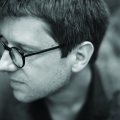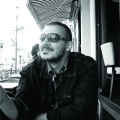
huśtawka
bądź poważny, wołają,
a więc zamykam oczy, myślę
o żelazie, cemencie spoczywającym
w workach, o słoniach, kotwicy w mule,
którą zręcznie omijają wieloryby,
o byczym łbie
kowadła. próbuję na chwilę choćby
zatrzymać powietrze, stanąć. lecz nic nie
wznosi się ani nie opada, kiedy
bażant pieje i z drzew lecą chmary
liści – nogi mam za krótkie, by dotknąć ziemi,
a głowę prawie w chmurach.
Przełożył Tomasz Ososiński
wippe
mach dich schwerer, rufen sie, also schließe
ich beide augen, denke
an säcke voll zement und eisengießereien,
elefanten, an den anker
in seinem schlamm, wo ein manöver wale
vorübergleitet, an das bullenhaupt
eines ambosses. nur eine weile
die luft anhalten, warten. doch nichts hebt
sich oder senkt sich, während ein fasan
schreit und die blätter fallen – meine unwilligen
beine zu kurz, um je den grund zu fassen,
mein kopf beinahe in den wolken.
Selbstporträt mit Bienenschwarm. Ausgewählte Gedichte 2001-2015
© 2016 Hanser Berlin in der Carl Hanser Verlag GmbH & Co. KG, München

Jan Wagner, urodził się w 1971 roku w Hamburgu. Jeden z najwybitniejszych w swojej generacji niemieckich poetów, tłumacz i krytyk literacki. Studiował anglistykę w Hamburgu, Dublinie i Berlinie. Od 1995 roku mieszka w Berlinie. Wydał 8 tomików poezji, m.in.: Probebohrung im Himmel, Australien, Poesiealbum 295, Regentonnenvariationen, za który w 2015 roku otrzymał Lipską Nagrodę Literacką w kategorii proza – po raz pierwszy w historii tej nagrody. Jest ponadto laureatem kilkunastu stypendiów, wyróżnień, nagród, w tym tak prestiżowych jak Mörike-Preis (2015), Nagroda Samuela Lindego (2016, razem z Kazimierzem Brakonieckim), Georg-Büchner-Preis (2017). W 2018 roku w ramach festiwalu Literaturfest München jest kuratorem projektu forum:autoren, którego motto brzmi „Piękno Babel. Europejskie lektury“. / fot. lberto Novelli – Villa Massimo
Jan Wagner, born in 1971 in Hamburg. One of the leading German poets of his generation, translator and literary critic. He studied English in Hamburg, Dublin and Berlin. He has lived in Berlin since 1995. He published 8 volumes of poetry, including: Probebohrung im Himmel, Australien, Poesiealbum 295, Regentonnenvariationen for which, in 2015, he was awarded the Leipzig Literary Award in the category of prose – for the first time in the history of this award. He is also a laureate of several scholarships, awards and prizes, including prestigious awards such as Mörike-Preis (2015), Samuel Bogumil Linde Prize (2016, together with Kazimierz Brakoniecki), Georg-Büchner-Preis (2017). In 2018, as part of the Literaturfest München festival, he is the curator of the forum:autoren project the motto of which is "The beauty of Babel. European reading". / fot. lberto Novelli – Villa Massimo

Tomasz Ososiński, urodził się w 1975 roku, germanista, filolog klasyczny i poeta, adiunkt Zakładu Starych Druków Biblioteki Narodowej oraz Lingwistycznej Szkoły Wyższej w Warszawie, redaktor Zeszytów Poetyckich. Zajmuje się historią literatury niemieckiego romantyzmu oraz inkunabulistyką. Tłumacz literatury łacińskiej i niemieckiej. Przełożył m.in. teksty Friedricha Schlegla, Rainera Marię Rilkego, Gottfrieda Benna, Paula Celana, Judith Hermann, Elfriede Jelinek, Jana Wagnera. W 2014 roku w jego tłumaczeniu ukazał się Dziennik schmargendorfski Rainera Marii Rilkego oraz Atlas wysp odległych Judith Schalansky.
Tomasz Ososiński, born in 1975, graduate in German studies, classical philologist and poet, Assistant Professor at the Department of Old Prints of the National Library and Warsaw School of Applied Linguistics, editor of Zeszyty Poetyckie. He deals with the history of German romantic literature and incunabula. Translator of Latin and German literature. He translated, for example, texts by Friedrich Schlegel, Rainer Maria Rilke, Gottfried Benn, Paul Celan, Judith Hermann, Elfriede Jelinek and Jan Wagner. In 2014, his translations of Rilke’s Schmargendorf diary and Judith Schalansky’s Atlas of Remote Islands were published.

